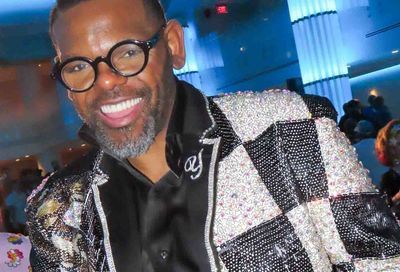Don Blanchon of Whitman-Walker remembers Jim Graham
The current Whitman-Walker ED recalls the impact of a legendary predecessor

Don Blanchon first met Jim Graham at a conference focusing on HIV/AIDS and LGBTQ health in 2003, three years prior to assuming his current post as executive director of Whitman-Walker Health.
“What I always remember about my first time with Jim was the whole notion that he was just bigger than life, this big character. Extremely creative, extremely smart, and just a ton of energy and toughness,” says Blanchon. “It’s something you could always count on with Jim.”
Graham, the former Ward 1 Councilmember on the D.C. Council, passed away on Sunday, June 11, following complications from C-Diff, a bacterial intestinal infection.
Blanchon says Graham is best remembered for his compassion for people at the margins of society, particularly those suffering from HIV during the height of the AIDS epidemic, when he served as Whitman-Walker’s executive director.
“The things you’ve seen in The Normal Heart or How to Survive a Plague, or any of the art and history around the epidemic, Jim lived it firsthand here,” says Blanchon. “And he didn’t just live it as a community member. He was a leader who put together a community response to fight back and resist and push down stigma and discrimination and fear, and drove a community response through community and political activism.
“But he [also] extended a huge amount of compassion to people who were dying, often times without any family or friends’ support, and did so compassionately through the clinic’s programs,” says Blanchon, adding that Graham primarily relied on the efforts of volunteers to “extend a modicum of kindness” to people suffering from AIDS “when people felt no hope.”
The long-lasting impact that Graham had on Whitman-Walker was the sense of urgency and “dogged determination” in fighting combating the HIV epidemic and providing people with the information and resources they needed to make better health choices.
“Our group is a scrappy group,” says Blanchon. “It’s a group that has a fight in it…. Jim knew how to fight, and how to get what he needed. He made no bones about the fact that injustice needed to be fought at the local level. Jim didn’t really see his time at the clinic and his time on the Council as different work. He thought of it as a continuation of the same work, which was ‘I’m fighting for people for whom society is not open and affirming. I’m fighting for a society that’s not just. For a society…hurt by institutions in our community.'”
Graham used his position on the council to advocate for better education and prevention services, as well as better delivery of health services.
“He obviously knew that there were certain groups, particularly within the LGBT community, that were really at risk of HIV, and knew that that risk moves over time,” says Blanchon. “He was very thoughtful about ‘how do we allocate funds and set policy to make sure the groups that are most at risk are getting the attention they need, so they’re not left by the side.'”
Support Metro Weekly’s Journalism
These are challenging times for news organizations. And yet it’s crucial we stay active and provide vital resources and information to both our local readers and the world. So won’t you please take a moment and consider supporting Metro Weekly with a membership? For as little as $5 a month, you can help ensure Metro Weekly magazine and MetroWeekly.com remain free, viable resources as we provide the best, most diverse, culturally-resonant LGBTQ coverage in both the D.C. region and around the world. Memberships come with exclusive perks and discounts, your own personal digital delivery of each week’s magazine (and an archive), access to our Member's Lounge when it launches this fall, and exclusive members-only items like Metro Weekly Membership Mugs and Tote Bags! Check out all our membership levels here and please join us today!




















You must be logged in to post a comment.